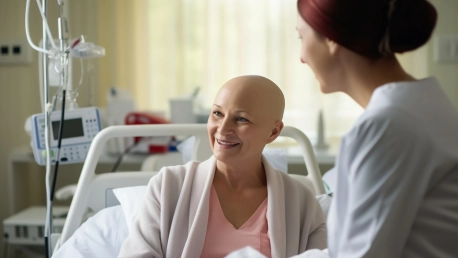The remote cancer patient monitoring platform Resilience recently received a significant financial boost. With $25 million in new funding, it stands to drastically change the way cancer care is provided. This investment marks an important affirmation of online technologies’ potential to relieve healthcare systems while offering cancer patients better, more responsive care.
A Revitalizing Financial Surge
Resilience’s Funding Journey
Since its establishment in 2021, Resilience has captured the attention and confidence of the investment world, having raised over €45 million to date. This latest injection of $25 million comes from a mix of existing and new investors, highlighting the strong belief in the efficacy and future potential of Resilience’s remote patient monitoring technology. Investors like Picus Capital, Red River West, and others recognize not just the innovative nature of Resilience’s system, but also the scalable business model that could disrupt the healthcare industry. As Resilience continues to grow and expand, the platform’s sophisticated approach to cancer care could become a new standard for oncologists and patients alike.
The Investors’ Bet on Resilience
The strategic investments by entities such as Picus Capital and newcomer Red River West reflect a belief that Resilience’s model is the way forward for cancer care. These investors have gone beyond just funding; they’ve provided strategic partnerships, helping position Resilience to make a lasting impact. The financial bet on Resilience’s technology signifies that these firms see a future where remote monitoring plays a critical role in patient outcomes, and they’re ready to support the innovation that makes this future a reality.
Relief for Overburdened Oncology Departments
Shifting Paradigms in Cancer Care
The ominous rise in cancer cases across the globe, coupled with severe healthcare staffing issues, places tremendous strain on clinics and oncology departments. Resilience’s platform leverages remote patient data collection to counteract these pressures, allowing healthcare providers to monitor patients effectively from a distance. This capability isn’t just about convenience; it represents a shift in the overall patient care model, where technology can offer individualized attention at scale. The incorporation of educational resources also means that patients are better equipped to engage with their treatment plans, mitigating the challenges posed by limited in-person consultations.
Clinical Efficiency and Patient Outcomes
Resilience’s groundbreaking platform has already started to show its benefits, with reports of decreased emergency visits and hospital stays for patients using the system. Perhaps even more remarkable is the indication that these patients may have a survival advantage over those not connected to the platform. These promising results underline the potential for such a platform not only to enhance healthcare efficiency but also to play a crucial role in the very prognosis of the patients. By applying this technology, the goal is a measurable improvement in the lives of those battling cancer.
Landmark Approval and Reimbursement in France
Breaking New Ground with Government Support
Resilience set a new precedent by becoming the first remote cancer monitoring system globally to gain approval for state reimbursement in France. This endorsement provides the platform free for patients and represents a groundbreaking step in healthcare coverage. The government’s decision to support remote monitoring showcases the growing recognition of digital health tools and sets a benchmark for other nations considering similar health tech adoption.
Ripple Effects: Healthcare Economics and Patient Access
The French reimbursement model pioneered by Resilience has the potential to reshape health economics. Making the platform free-of-charge for patients paves the way for greater access to cutting-edge care, regardless of personal financial constraints. The model promotes value-based care that could inspire a broader adoption of such technologies, leading to more empowered patients across various healthcare sectors.
Expansion Plans and Strategic Acquisitions
Paving the Way into Germany and Beyond
As Resilience eyes global expansion, Germany presents a ripe market for its remote monitoring platform. While German reimbursement structures are not yet in place for such digital health apps, negotiations with regulatory bodies signify the first steps toward integration. Should these efforts prove successful, it could mark the beginning of wider European uptake and ultimately global penetration, making Resilience a major player in international healthcare innovation.
Diversifying Healthcare Services
The strategic acquisition of GutyCare and the development of a new RPM platform for pharmaceutical clinical trials illustrate Resilience’s commitment to broadening its impact. These moves signal the company’s aspiration to not only lead in cancer care but to influence patient monitoring across various health conditions and industries. Such diversity in services reflects the adaptability of Resilience’s technology and its scalable benefits to areas beyond oncology.
Resilience and the Future of Clinical Trials
A Bold Prediction for the RPM Market
Resilience founders forecast their platform becoming an indispensable asset in the growing RPM market, especially in clinical trials. With the industry projected to expand significantly, the company positions itself at the forefront of technologically empowered research. The vision is clear: to revolutionize monitoring in clinical settings, ultimately leading to greater efficacy and patient care within pharmaceutical studies.
Tapping into Pharmaceutical Revenue Streams
Resilience’s recent $25 million boost represents a significant affirmation of confidence in the platform’s potential to transform cancer care. It signals an important shift towards utilizing online technologies that can alleviate burdens on healthcare infrastructures and provide cancer patients with better, more timely care.The rise of telehealth, catalyzed by an increased demand for healthcare and personalized care, finds platforms like Resilience leading the change. Their system enables real-time patient monitoring and data collection, providing oncologists a vital tool for making informed decisions and offering patients quality care remotely. This not only increases the efficiency of healthcare delivery but also enhances the patient’s quality of life.This financial milestone for Resilience underscores the crucial role of digital health solutions in modern healthcare. With this new funding, Resilience is set to bring forth a more responsive, personalized, and patient-centric approach to cancer treatment, elevating the standard of care in oncology.









